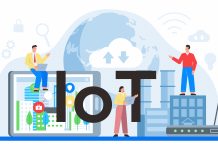Automation has been a true game-changer for global industries. Automation is driving a new era of opportunities for organizations, regardless of size, to eliminate the chances of manual error and help businesses find ways to streamline their operations.
Library management is no different. Effectively using IoT development, libraries are revolutionizing their work. From book cataloging to tracking books on shelves and more, libraries are leveraging automation tools to make the operations smoother and more efficient.
Library automation systems combine hardware and software solutions that circulate and catalog in a library. With an efficient IoT-based library management system, libraries can automate tasks such as:
- Cataloging, which includes resource storage, management, and retrieval
- The circulation takes care of books lending and returning, membership renewal and hold, etc.
- The acquisition consists of tasks such as acquisition process management, orders, receiving, returns, and cancellations
- The Serial Control process includes order placement, cancellations, claims, returns, etc.
- Accounting processes include employee payments, creating and implementing payment policies, etc.
Let’s see what benefits IoT-based library automation, and monitoring systems offer.

Benefits of IoT-based Library Automation and Monitoring System
Information and data across libraries are growing at a terrific pace. With global consumers’ involvement and the libraries’ digitalization, this data has increased manifold. Libraries can use this data to drive the decision-making process and boost the quality of their services. This is where IoT-based library management systems come in.
These systems don’t just make sense of this data for improving the processes but also add value to this information. For instance, if there is a genre of book popular among Gen Z customers, IoT systems can help you figure out the trends and patterns to direct your investments in the right direction.
However, this is not the end of the story. Here is what else IoT-based library automation and monitoring systems bring to the table:
- Library management involves a lot of repetitive and tedious tasks. Multiple factors can affect their productivity when human resources are hired to do this task. For instance, on a good day, people may be able to offer exceptional customer experience and the best efficiency. However, that won’t be the case when they are tired. Automation systems are not affected by this.
- Automation makes it easier for users to know about the available books and pass on the information for others to view.
- Automation results in operational efficiency, ease of functioning, accuracy, and speed.
- Library staff can be free from the clerical chores and focus on more important things for property functioning in the library.
- Remote users can access the information at the tip of their fingers, making library management more seamless and accessible.
- Libraries can boost the effectiveness of their marketing campaigns by targeting the right customers with better information about their behavior, preferences, reading habits, and more.
- Asset monitoring can be done easily with IoT-based systems. They use RFID tags to track each asset within the library to eliminate the chances of misuse, theft, etc.
- Technologies such as bar code scanning and asset monitoring make book management and record keeping much easier.
- Automation of administrative tasks helps save money and time.
- Database automation helps reduce errors and make data entry more accurate while eliminating duplicate entries.
Still, Working on Traditional Paper-based Methods?
It’s time to change your operations for the better. The above benefits encourage libraries to hire IoT developers or IoT development companies to automate their libraries. Besides process automation, IoT-based systems have a lot to offer while adding value to the organization’s fundamental building blocks. IoT-powered solutions in the education industry are challenging traditional paradigms and emerging victorious on all parameters. If you are still on the fence about it, hire IoT consultants immediately to understand what challenges you can address with the right IoT solutions.
Author Bio:
Nainika Gautam-Sharma is a Senior Content Specialist at Matellio. Her forte transforms her thoughts into words on paper and brings real value to the readers. She loves to write about IoT development services and businesses of various sizes and industries that can drive value from the right implementation. She also likes to explore digital content marketing and other technologies like web and mobile, AI, and cloud, besides a lot many. When she is not writing, she spends time being a foodie and cooking new recipes, traveling with her family, and kicking back with books.






